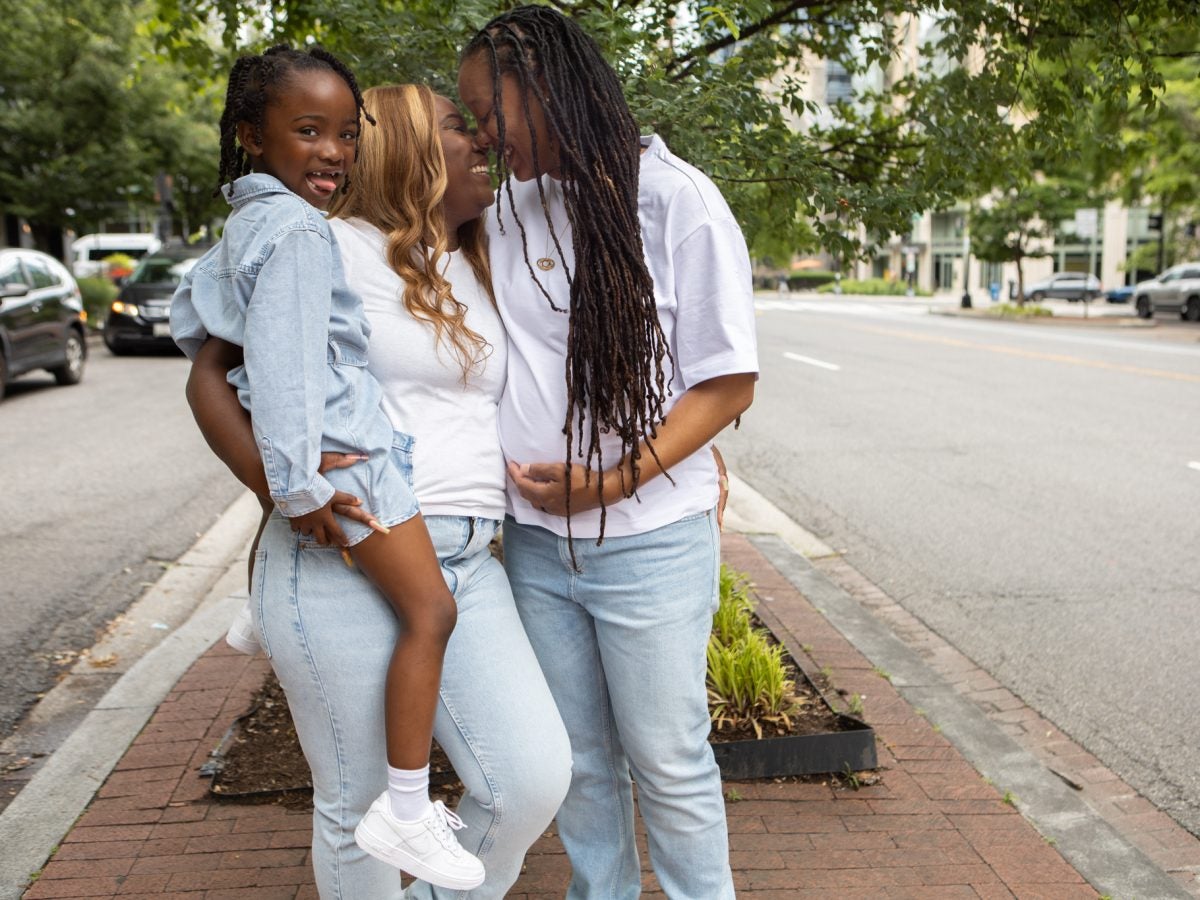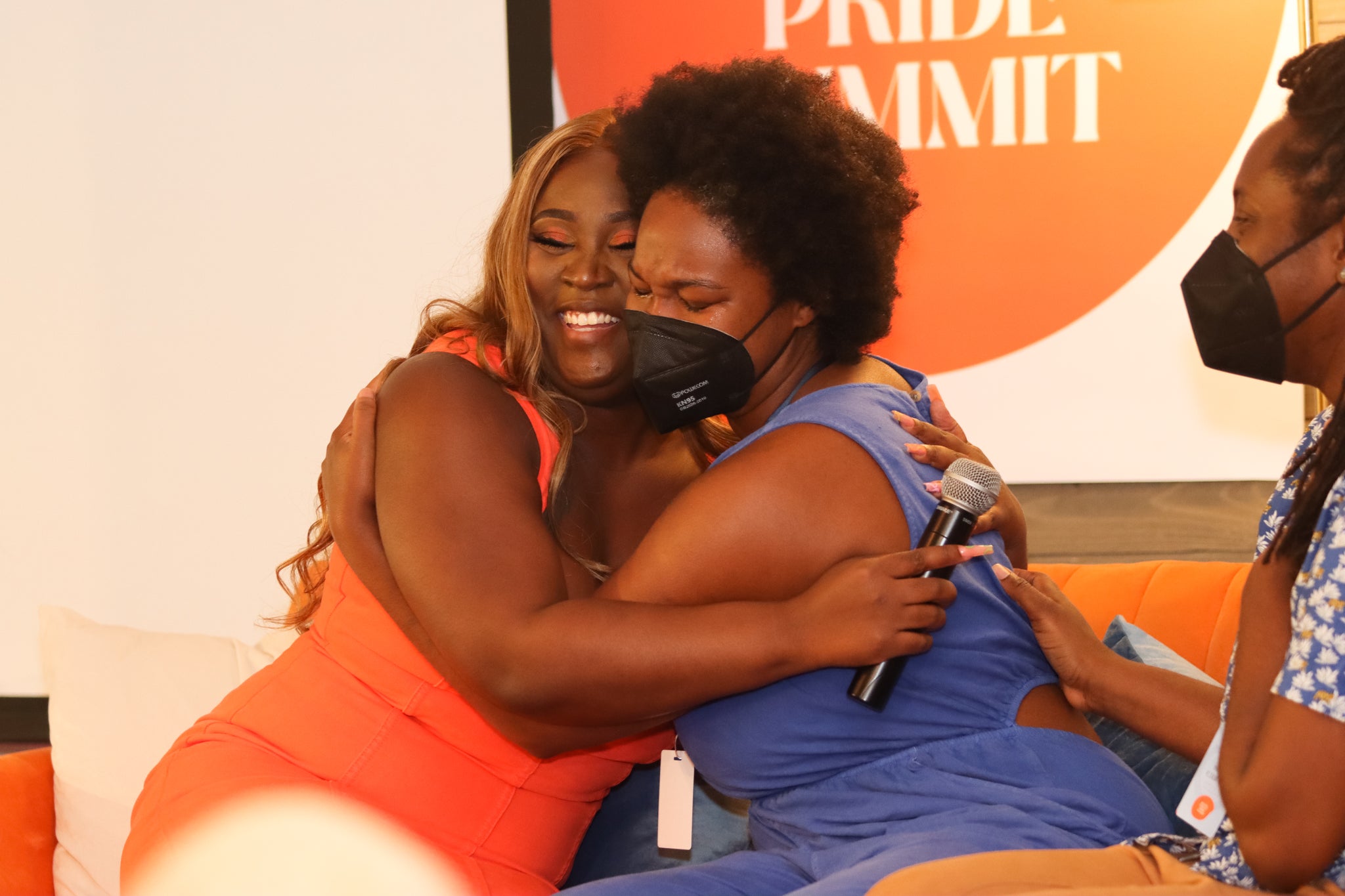
A mother of two, Mia Cooley, like many moms, has taken to the Internet countless times to find answers to her questions about childrearing. She was the first person in her friend group to have a baby and has always understood the importance of seeking community. It was especially important for her to find it as a Black pansexual woman in a two-mom household.
“Becoming a parent can be kind of lonely and isolating,” she tells ESSENCE. “But especially for a queer community. If we’re not in touch with our biological family or we’re estranged from them for whatever reason, then you’re looking for that community.”
But what she stumbled into as she tried out different parenting groups was nothing like what she had expected or hoped for. She recalls a debate she encountered over a person’s daughter asking for a Spider-Man cake for her birthday, which quickly went awry. Other spaces, specifically for Black parents, left her running into “a lot of racism.” She just never felt true support.
“I was like, ‘Okay, I should be able to exist and be and ask and celebrate in these spaces.’ But I wasn’t able to do that,” she says. “I spent all of my time arguing with people about queer family dynamics, about the right for queer youth to exist.”
Those experiences would provide inspiration, with Cooley deciding to start her own space specifically for Black queer parents. It helped that Cooley had a background in tech and had done the work, from a technical perspective, to see how one can solve the issues of underrepresented minorities and marginalized communities. In May of 2019, ahead of Mother’s Day, she launched xHood. It was at the perfect time, as parents sought answers to some tough questions, like how a two mom household should celebrate the holiday. (The answer her site would provide is that parents can split the weekend; one of the moms can have Father’s Day; and they can celebrate in shifts, with one mom getting breakfast in bed while the other gets dinner.)
In addition to answering pressing questions and being a safe space for Black queer parents and caregivers, Cooley and co. also make sure to speak on homophobia, transphobia, racism, the Black maternal health crisis, reproductive violence and more on the site. And in order to truly be a safe space, they decided to limit access to the group after initially allowing cisgender parents of LGBTQ+ youth to be a part.
“There would be triggering questions, triggering topics brought up about how it is to raise queer youth. And so it was being hurtful to more of the parents in the space than those who were raising queer youth,” she shares. “So I’ve been able to redirect some of those who are raising queer youth to other groups if they are not queer themselves. We do of course have parents who are queer and raising queer youth, and of course we support them. But as far as if you are cisgender or not same gender loving, then you would not be within the xHood space.”
XHood is behind the Black Parent Pride Summit, which made its debut in Atlanta in 2022. The second iteration was recently held in Washington D.C. to honor that D.C. was the first place to have gatherings of Black Pride events. Over 200 guests came to feel the love. It was important now more than ever before as queer parents find themselves under attack.

“I think initially when people think of well supported, happy, successful parents and families, they’re not thinking of Black queer families. And I think historically, we just weren’t considered when it came to family leave policies, fertility and medical insurance coverage or state parentage laws. But now it’s kind of a little bit more aggressive or violent towards our families because there are over 500 pieces of legislation just fighting against our right to exist. Not even specifically just our right to build family, but our right to just be queer people,” she says. “And so, where other families get to focus on raising happy, healthy children, we don’t get to focus on that. And I think that we deserve to be able to do that. And that’s why it’s important to focus on us and prioritize us now.”
A way they honored the families of Black queer parents at this year’s event in late May was by having those attending provide pictures of their families or love letters to their broods if they didn’t, and these items were presented in such a way as they would be on, for example, the mantle or end table of your parents or grandparents’ home.
“A lot of our families won’t have that experience, whether it’s because they’re moving away from their families or state political reasons or legislations or because, like I said, they’re living authentically in their queerness that they won’t be able to have those family experiences. We wanted to be able to gift that experience and it was so overwhelming,” she says.
For the future, Cooley has big hopes and even bigger plans for both the page and the Black Parent Pride event. She wants to take the latter to more cities, with calls from her community of more than 4,000 to bring it out West and down South. Via the site, she wants to put parents and parents-to-be in contact with medical providers, including fertility providers and therapists, who are able to “life affirming for their queer identities.” She even foresees the possibility of birthing centers for this particular group of parents.
Her goals are all with the intention of ensuring that queer parents will no longer feel ignored in parenting conversations or alone as they do the daily work of raising kids and seek community in that Herculean task.
“What it really boils down to is I want xHood to be the place that queer parents can come and feel confident, whatever their next chapter of parenting looks like,” Cooley says. “Whether that’s trying to go from trying to conceive to pregnant or trying to adopt to blending families or you’re about to be an empty nester. I want them to feel supported in whatever that looks like for their queer parenting journey.”